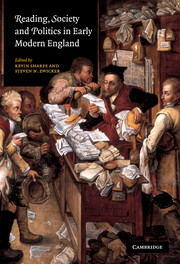Book contents
- Frontmatter
- Contents
- List of illustrations
- List of contributors
- Acknowledgements
- Introduction: discovering the Renaissance reader
- Part I THE MATERIAL TEXT
- 1 Errata: print, politics and poetry in early modern England
- 2 Abandoning the capital in eighteenth-century London
- Part 2 READING AS POLITICS
- Part 3 PRINT, POLITICS AND PERFORMANCE
- Part 4 READING PHYSIOLOGIES
- Part 5 READING IN THE TIME
- Index
1 - Errata: print, politics and poetry in early modern England
Published online by Cambridge University Press: 22 September 2009
- Frontmatter
- Contents
- List of illustrations
- List of contributors
- Acknowledgements
- Introduction: discovering the Renaissance reader
- Part I THE MATERIAL TEXT
- 1 Errata: print, politics and poetry in early modern England
- 2 Abandoning the capital in eighteenth-century London
- Part 2 READING AS POLITICS
- Part 3 PRINT, POLITICS AND PERFORMANCE
- Part 4 READING PHYSIOLOGIES
- Part 5 READING IN THE TIME
- Index
Summary
Agnosco, fateor …
Guillaume Budé, letter to Erasmus, 1 May 1516 (epistle 403)I do not think that I have ever published anything that did not have an error in it. Typos have crept in and escaped proofreading. Mis-citations and mistranslations have refused correction. Facts and judgements have, at times, seemed almost wilfully in opposition to empirical evidence or received opinion. It is the duty of our readers, so it seems, to catch such errors. Referees for publishers and book reviewers for journals often begin well and well-meaningly enough. But praise soon shatters into pedantry, and reports and reviews will often end with catalogues of broken lines and phrases: errata uncaught by editor or author, blots on the reputation of the scholar's knowledge or his critical acumen.
I'm not alone. All creatures of the academic life subject themselves to such reviewing, and most practise it themselves. To have been savaged and to savage, whether veiled behind the scrim of the anonymous report or displayed in the full acknowledgement of the printed by-line, is the mark of my business: the rite of passage and the passing of one's rights. It is as if I've led an erroneous life, as if what should be totted up on the pages of the book of judgement – or, more prosaically, in annual decanal salary reviews – are not achievements but mistakes. We live, in the academy, by blunder.
- Type
- Chapter
- Information
- Reading, Society and Politics in Early Modern England , pp. 41 - 71Publisher: Cambridge University PressPrint publication year: 2003
- 5
- Cited by



